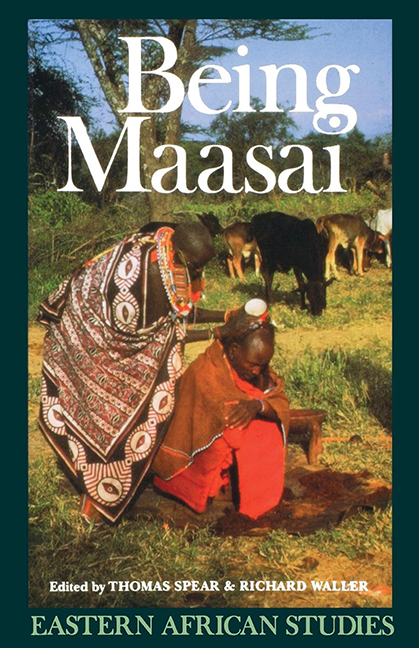Book contents
- Frontmatter
- Contents
- Maps, Figures & Illustrations
- Contributors
- Acknowledgements
- I Introduction
- II Becoming Maasai: Introduction
- III Being Maasai: Introduction
- IV Contestations and Redefinitions: Introduction
- 11 Acceptees and Aliens: Kikuyu Settlement in Maasailand
- 12 Land as Ours, Land as Mine: Economic, Political and Ecological Marginalization in Kajiado District
- 13 Maa-Speakers of the Northern Desert: Recent Developments in Ariaal and Rendille Identity
- V Conclusions
- Bibliography
- Index
12 - Land as Ours, Land as Mine: Economic, Political and Ecological Marginalization in Kajiado District
from IV - Contestations and Redefinitions: Introduction
Published online by Cambridge University Press: 30 August 2017
- Frontmatter
- Contents
- Maps, Figures & Illustrations
- Contributors
- Acknowledgements
- I Introduction
- II Becoming Maasai: Introduction
- III Being Maasai: Introduction
- IV Contestations and Redefinitions: Introduction
- 11 Acceptees and Aliens: Kikuyu Settlement in Maasailand
- 12 Land as Ours, Land as Mine: Economic, Political and Ecological Marginalization in Kajiado District
- 13 Maa-Speakers of the Northern Desert: Recent Developments in Ariaal and Rendille Identity
- V Conclusions
- Bibliography
- Index
Summary
A fundamental characteristic of the Maasai economy is its concept of land use. The patterns of ownership and use reflect a variety of social, political and economic characteristics of their society and its interaction with the environment. The land was traditionally seen as a communal territory containing resources rather than as a resource which could be appropriated by individuals. The use of the territory was governed by social and political conventions designed to reduce the risks associated with the unpredictable climate of the semi-arid environment.
Over the past century forces from beyond and within Maasai society have altered the pattern of land use and land ownership such that fundamental aspects of the Maasai system have been changed. At the outset of the colonial period the territory of the Maasai was curtailed by treaty with the British. This together with subsequent losses of land to farming and to wildlife uses have severely restricted the resources available. With population growth, land pressure increased. Encouraged by government policy and informed by the desire to protect their territory from encroaching land uses, Maasai agreed to the demarcation of land units to which individuals or groups held legal title. Continued demand for land from both within and beyond Maasailand has finally resulted in the concept of land as territory being replaced by that of individual holdings.
The resulting land units are ecologically incapable of supporting the dairy economy and a major social and economic transformation is inevitable. Poorer Maasai are selling their land and in the absence of alternative economic opportunity are joining the rapidly increasing class of the ecologically, economically, and politically marginalized already deprived of their land-based economy elsewhere in Kenya.
The contemporary situation faced by the majority of Maasai is markedly different from that which existed prior to colonization. While many values and traditions are still known and held, the basis of the economy, the concept of land as territory, has been transformed such that the survival of their herding system is in jeopardy. This situation is but the current point in a process of change in rural society as it adapts to the opportunities and constraints of the emerging national economic, social, and political systems.
- Type
- Chapter
- Information
- Being MaasaiEthnicity and Identity in East Africa, pp. 258 - 272Publisher: Boydell & BrewerPrint publication year: 1993

